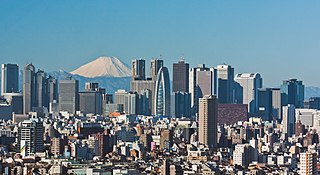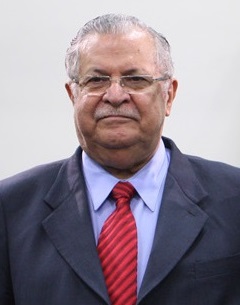
The Iraqi Kurdistan–Israel relations covers the historical background of relations between the Kurdish and Jewish peoples, and the current political and economic relations between the Iraqi Kurdistan and the State of Israel.

Economy in Iraqi Kurdistan consists of the autonomous economy in Kurdistan region in northern Iraq. The Kurdistan region's economy is dominated by the oil industry, agriculture and tourism. Due to relative security and peace in the region and more economically liberal and market-oriented policies, it has a far more developed economy in comparison to other parts of Kurdistan.
Iraqi Kurdistan–Palestine relations covers the diplomatic, political, and cultural relations between the semi-autonomous Region of Iraqi Kurdistan with the Palestinian Authority (1994–2012) and the State of Palestine.

An independence referendum for Iraqi Kurdistan was held on 25 September 2017, with preliminary results showing approximately 93.25 percent of votes cast in favour of independence. Despite reporting that the independence referendum would be non-binding, the autonomous Kurdistan Regional Government (KRG) characterised it as binding, although they claimed that an affirmative result would trigger the start of state building and negotiations with Iraq rather than an immediate declaration of independence of Kurdistan. The referendum's legality was rejected by the federal government of Iraq.

Hungary–Kurdistan Region relations are bilateral relations between Hungary and the Kurdistan Region. Hungary has been represented in Kurdistan Region through a consulate general since November 2014, while Kurdistan Region has no representation in Hungary. Nevertheless, the relations are characterized by several high-level talks and close ties. The Kurdish President Massoud Barzani has visited Hungary in 2012 and in 2015 on official visits.

Czech Republic–Kurdistan Region relations are bilateral relations between the Czech Republic and the Kurdistan Region. The Czech Republic is represented in the Kurdistan Region through a consulate general in Erbil since 2006, while the Kurdistan region has no representation in the Czech Republic. Relations between the two are characterized by high level talks and cooperation against ISIS. Kurdish President Massoud Barzani visited the Czech Republic in 2015, meeting President Miloš Zeman and other senior government officials. In November 2015, Czech President Miloš Zeman said that he believes the Kurdistan Region will soon become independent.

Bulgaria–Kurdistan Region relations are bilateral relations between Bulgaria and the Kurdistan Region. Bulgaria is represented in Kurdistan Region through a commercial office in Erbil since 2014, while Kurdistan Region has no representation in Bulgaria. In 2012, Kurdish President Massoud Barzani travelled to Bulgaria on an official visit and met with Bulgarian President Rosen Plevneliev and Prime Minister Boyko Borisov. In May 2017, President Barzani met with President Boyko Borislov on an official visit to Bulgaria.

Kurdistan Region–Poland relations are bilateral relations between Kurdistan Region and Poland. Kurdistan Region is represented in Kurdistan Region through a representation in Warsaw since 2004, while Poland has a consulate general in Erbil since 2012. In 2005, Polish Prime Minister Marek Belka, Foreign Minister Adam Rotfeld, Minister of National Defense Jerzy Szmajdziński and Minister of Culture Waldemar Dąbrowski met Kurdish President Masoud Barzani and Prime Minister Nechirvan Barzani in Erbil and stated their support for the reconstruction of Iraq, including Kurdistan Region.
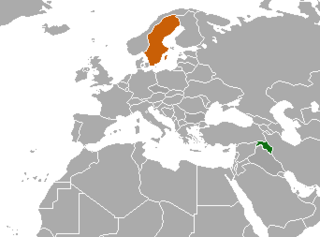
Kurdistan Region–Sweden relations are bilateral relations between Kurdistan Region and Sweden. Kurdistan Region is represented in Sweden through a representation in Stockholm since 2011, while Sweden has an embassy in Erbil since 2012.

Kurdistan Region–Netherlands relations are bilateral relations between Kurdistan Region and the Netherlands. While Kurdistan Region has no representation in the Netherlands, the Netherlands has a consulate general in Erbil since 2012. The Netherlands has a military presence in Kurdistan Region and have aided the region with humanitarian aid. The Netherlands also contributed to reforms of the Kurdish economy with 250,000 euros in 2017. In August 2016, Dutch Prime Minister Mark Rutte visited Kurdistan Region and met with high-ranking Kurdish officials and deployed Dutch soldiers. Concerning Kurdish independence, Dutch MP Harry Van Bommel stated that: "I will ask my party to support independent Kurdistan because I think independence is the best way to secure the future of the people in this Region".

Belgium–Kurdistan Region relations are bilateral relations between Belgium and Kurdistan Region. Belgium has no representation in Kurdistan Region and the latter has no representation in Belgium. Kurdistan Region's representation to the European Union is located in the Belgian capital of Brussels. Belgium has a military presence in Kurdistan Region with circa 30 soldiers training Kurdish soldiers (Peshmerga). In 2017, Kurdish President Massoud Barzani visited Belgium and met with Minister-President Geert Bourgeois of the federal region of Flandern, where the latter stated that the upcoming Kurdish referendum in September 2017 should be respected and Deputy Prime Minister of the federal government in Belgium Jan Jambon has stated that all nations have the right to self-determination.
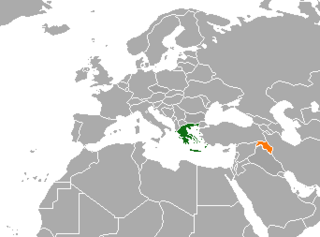
Greece–Kurdistan Region relations are bilateral relations between Greece and Kurdistan Region. Greece has an economic and commercial office in Erbil, while Kurdistan Region has no representation in Greece. In February 2017, Greek Foreign Minister Nikos Kotzias described Kurdistan as having a geostrategic role in the region and constitutes an important element in Greek geostrategic policy, and these were the reasons Greece opened a consulate general in Erbil in May 2016. In an interview with Alpha Radio, Kotzias stated that the Kurdish independence referendum in September 2017 was guaranteed by the Iraqi constitution and that Kurdistan Region has a right to hold it. Vice-President of the Greek party New Democracy Adonis Georgiadis has stated that his party supports the referendum and the Kurdish right to self-determination.
Kurdistan Region–United Arab Emirates relations are bilateral relations between Kurdistan Region and United Arab Emirates. While Kurdistan Region has no representation the United Arab Emirates, the latter has a consulate general in Erbil since 2012. The opening of an Emirati consulate general was discussed during a visit in Erbil by Emirati Foreign Minister Abdullah bin Zayed Al Nahyan in February 2011. Kurdish specialist Marianna Charountaki believes that the United Arab Emirates "interacts with the KRG as a de facto state entity". Kurdish Prime Minister Nechirvan Barzani has described the ties with the United Arab Emirates as being: "very important to the Kurds. They have offered their services to help us in the region. We have very good relations with all [the GCC members] but ties with the UAE are closer. The UAE are interested in investments and energy". Emirati Minister of Cabinet Affairs & the Future Mohammed Al Gergawi described the ties between the United Arab Emirates and Kurdistan Region as "good". He stated that: "We will need the Kurdistan Region and the Kurdistan Region will need us because we have the same principles and concerns".
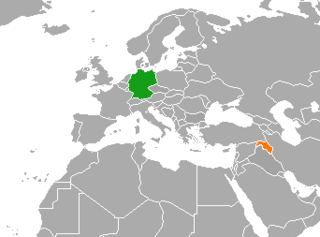
Germany–Kurdistan Region relations are bilateral relations between Germany and Kurdistan Region. Germany has a consulate general in Erbil since 2012, and Kurdistan Region has a representation in Berlin since 1992. Many high-level meetings have been held between the two parties, including a visit to Berlin by Kurdish President Masoud Barzani in 2009, where he met with German Chancellor Angela Merkel and Foreign Minister Frank-Walter Steinmeier. In 2014, President Barzani described Germany as "one of Kurdistan Region’s staunch allies in the war against the Islamic State." German Consul General Marc Eichhorn described the relations as "excellent".
Holy See–Kurdistan Region relations are bilateral relations between Holy See and Kurdistan Region. The Holy See has no representation in Kurdistan Region and the latter has no representation in the Holy See. Kurdish President Masoud Barzani has met with Pope John Paul II and his two successors Pope Benedict XVI and Pope Francis on official visits to the Vatican City in November 2005, February 2011 and May 2014. Kurdish Prime Minister Nechirvan Barzani also met with Pope Francis in March 2015, discussing the humanitarian crisis in the Kurdish region and Barzani stressed his hope for an papal encouragement for the international society to support Kurdistan Region humanitarianly. At the meeting, Pope Francis praised the atmosphere in Kurdistan. Shortly after, Pope made an unspecified donation for Kurdistan Region to cope with the displaced Christian population. In the same month, the Pope's personal envoy including Cardinal Fernando Filoni and a delegation from the Congregation for the Evangelization of Peoples. It was the envoy's second visit to Erbil after a similar visit took place in August 2014. In 2016, the Pope donated 110,000 dollars to the St. Joseph's Clinic in Erbil, which is home to thousands of internally displaced persons, and sent a financial donation to displaced Iraqi Christians in Erbil through the Aid to the Church in Need.

France–Kurdistan Region relations are bilateral relations between France and Kurdistan Region. France has a consulate general in Erbil and Kurdistan Region has a representation in Paris. The ties between France and Kurdistan Region have been very close since the presidency of François Mitterrand (1981–1995), when his wife Danielle Mitterrand played an instrumental role in the campaign for the no fly zone over Kurdistan Region in 1991. France has a military presence in Kurdistan Region, and Consul General Dominique Mas described their relations as being "historic" and "long-term".


